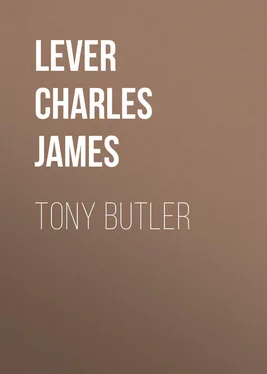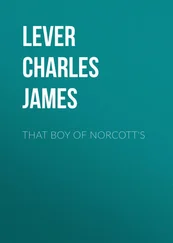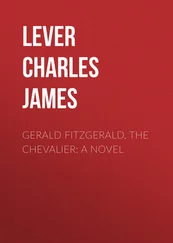Charles Lever - Tony Butler
Здесь есть возможность читать онлайн «Charles Lever - Tony Butler» — ознакомительный отрывок электронной книги совершенно бесплатно, а после прочтения отрывка купить полную версию. В некоторых случаях можно слушать аудио, скачать через торрент в формате fb2 и присутствует краткое содержание. Жанр: literature_19, foreign_antique, foreign_prose, на английском языке. Описание произведения, (предисловие) а так же отзывы посетителей доступны на портале библиотеки ЛибКат.
- Название:Tony Butler
- Автор:
- Жанр:
- Год:неизвестен
- ISBN:нет данных
- Рейтинг книги:3 / 5. Голосов: 1
-
Избранное:Добавить в избранное
- Отзывы:
-
Ваша оценка:
- 60
- 1
- 2
- 3
- 4
- 5
Tony Butler: краткое содержание, описание и аннотация
Предлагаем к чтению аннотацию, описание, краткое содержание или предисловие (зависит от того, что написал сам автор книги «Tony Butler»). Если вы не нашли необходимую информацию о книге — напишите в комментариях, мы постараемся отыскать её.
Tony Butler — читать онлайн ознакомительный отрывок
Ниже представлен текст книги, разбитый по страницам. Система сохранения места последней прочитанной страницы, позволяет с удобством читать онлайн бесплатно книгу «Tony Butler», без необходимости каждый раз заново искать на чём Вы остановились. Поставьте закладку, и сможете в любой момент перейти на страницу, на которой закончили чтение.
Интервал:
Закладка:
It was about five o’clock in the same evening when the great man again appeared at the same place; he was flushed and weary-looking. Some rebellious spirits – is not the world full of them? – had dared to oppose one of his ordinances. They had ventured to question some subsidy that he would accord or refuse to some local line of railroad. The opposition had deeply offended him; and though he had crushed it, it had wounded him. He was himself the bank! – its high repute, its great credit, its large connection, were all of his making; and that same Mr. M’Candlish who had dared to oppose him was a creature of his own, – that is, he had made him a tithe-valuator, or a road-inspector, or a stamp distributor, or a something or other of the hundred petty places which he distributed just as the monks of old gave alms at the gates of their convents.
Sir Arthur whispered a word to Mr. Boyd, the secretary, as he passed downstairs. “How does M’Candlish stand with the bank? He has had advances lately; send me a note of them.” And thus, bent on reprisals, he stood waiting for that gorgeous equipage which was now standing fully ready in the inn yard, while the coachman was discussing a chop and a pot of porter. “Why is not he ready?” asked Sir Arthur, impatiently.
“He was getting a nail in Blenheim’s off foreshoe, sir,” was the ready reply; and as Blenheim was a blood bay sixteen-three, and worth two hundred and fifty pounds, there was no more to be said; and so Sir Arthur saw the rest of the board depart on jaunting-cars, gigs, or dog-carts, as it might be, – humble men with humble conveyances, that could take them to their homes without the delays that wait upon greatness.
“Anything new stirring, Boyd?” asked Sir Arthur, trying not to show that he was waiting for the pleasure of his coachman.
“No, sir; all dull as ditch-water.”
“We want rain, I fancy, – don’t we?”
“We ‘d not be worse for a little, sir. The after-grass, at least, would benefit by it.”
“Why don’t you pave this town better, Boyd? I ‘m certain it was these rascally stones twisted Blenheim’s shoe.”
“Our corporation will do nothing, sir, – nothing,” said the other, in a whisper.
“Who is that fellow with the large whiskers, yonder, – on the steps of the hotel? He looks as if he owned the town.”
“A foreigner, Sir Arthur; a Frenchman or a German, I believe. He came over this morning to ask if we knew the address of Mr. Norman Maitland.”
“Count Caffarelli,” muttered Sir Arthur to himself; “what a chance that I should see him! How did he come?”
“Posted, sir; slept at Cookstown last night, and came here to breakfast.”
Though the figure of the illustrious stranger was very far from what Sir Arthur was led to expect, he knew that personal appearance was not so distinctive abroad as in England, and so he began to con over to himself what words of French he could muster, to make his advances. Now, had it been Hindostanee that was required, Sir Arthur would have opened his negotiations with all the florid elegance that could be wished; but French was a tongue in which he had never been a proficient, and, in his ordinary life, had little need of. He thought, however, that his magnificent carriage and splendid horses would help him out of the blunders of declensions and genders, and that what he wanted in grammar he could make up in greatness. “Follow me to M’Grotty’s,” said he to his coachman, and took the way across the square.
Major M’Caskey – for it was no other than that distinguished gentleman – was standing with both hands in the pockets of a very short shooting-jacket, and a clay pipe in his mouth, as Sir Arthur, courteously uncovering, bowed his way up the steps, saying something in which l’honneur, la félicité, and infiniment flatté , floated amidst a number of less intelligibly rendered syllables, ended the whole with “ Ami de mon ami , M. Norman Maitland.”
Major M’Caskey raised his hat straight above his head and replaced it, listening calmly to the embarrassed attempts of the other, and then coldly replied in French, “I have the honor to be the friend of M. Maitland, – how and when can I see him?”
“If you will condescend to be my guest, and allow me to offer you a seat with me to Lyle Abbey, you will see your friend.” And, as Sir Arthur spoke, he pointed to his carriage.
“Ah, and this is yours? Pardie! it’s remarkably well done. I accept at once. Fetch down my portmanteau and the pistol-case,” said he to a small, ill-looking boy in a shabby green livery, and to whom he spoke in a whisper; while, turning to Sir Arthur, he resumed his French.
“This I call a real piece of good-fortune, – I was just saying to myself, ‘Here I am; and though he says, Come! how are we to meet?’”
“But you knew, Count, that we were expecting you.”
“Nothing of the kind. All I knew was his message, ‘Come here.’ I had no anticipation of such pleasant quarters as you promise me.”
Seated in the post of honor on the right of Sir Arthur, the Major, by way of completing the measure of his enjoyments, asked leave to smoke. The permission was courteously accorded, and away they rolled over the smooth highway to the pleasant measure of that stirring music, – the trot of four spanking horses.
Two – three – four efforts did Sir Arthur make at conversation, but they all ended in sad failure. He wanted to say something about the crops, but he did not remember the French for “oats;” he wished to speak of the road, but he knew not the phrase for “grand jury;” he desired to make some apology for a backward season, but he might as well have attempted to write a Greek ode; and so he sat and smiled and waved his hand, pointing out objects of interest, and interjectionally jerking out, “Bons – braves – très braves – but poor – pauvres – très pauvres – light soil – légère, you understand,” and with a vigorous “hem” satisfied himself that he had said something intelligible. After this no more attempts at conversation were made; for the Major had quietly set his companion down for an intense bore, and fell back upon his tobacco for solace.
“Là!” cried the Baronet, after a long silence – and he pointed with his finger to a tall tower, over which a large flag was waving, about half a mile away, – “Là! Notre chateau – Lyle Abbey – moi;” and he tapped his breast to indicate the personal interest that attached to the spot.
“Je vous en fais mes compliments,” cried M’Caskey, who chuckled at the idea of such quarters, and very eloquently went on to express the infinite delight it gave him to cultivate relations with a family at once so amiable and so distinguished. The happy hazard which brought him was in reality another tie that bound him to the friendship of that “cher Maitland.” Delivered of this, the Major emptied his pipe, replaced it in its case, and then, taking off his hat, ran his hands through his hair, arranged his shirt-collar, and made two or three other efforts at an improvised toilet.
“We are late — en retard – I think,” said Sir Arthur, as they drew up at the door, where two sprucely dressed servants stood to receive them. “We dine – at eight – eight,” said he, pointing to that figure on his watch. “You ‘ll have only time to dress, – dress;” and he touched the lappet of his coat, for he was fairly driven to pantomime to express himself. “Hailes,” cried he to a servant in discreet black, “show the Count to his room, and attend to him; his own man has not come on, it seems,” and then, with many bows and smiles and courteous gestures, consigned his distinguished guest to the care of Mr. Hailes, and walked hurriedly upstairs to his own room.
Читать дальшеИнтервал:
Закладка:
Похожие книги на «Tony Butler»
Представляем Вашему вниманию похожие книги на «Tony Butler» списком для выбора. Мы отобрали схожую по названию и смыслу литературу в надежде предоставить читателям больше вариантов отыскать новые, интересные, ещё непрочитанные произведения.
Обсуждение, отзывы о книге «Tony Butler» и просто собственные мнения читателей. Оставьте ваши комментарии, напишите, что Вы думаете о произведении, его смысле или главных героях. Укажите что конкретно понравилось, а что нет, и почему Вы так считаете.












